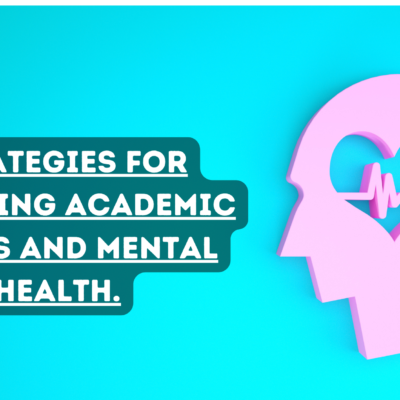Strategies for Managing Academic Stress and Mental Health: The journey of academic excellence is usually accompanied by challenges and stress that can impact our mental health. As students walk on the journey of coursework, exams, and extracurricular activities, it becomes important to prioritize mental well-being. So, here in this article, we will talk about useful strategies to deal with academic stress and balancing mental health.
Also Read:
- How to Handle The Feeling of Rejection?
- Empathy Without Boundaries is Self Destruction- How to Deal with it?
- Tips for Becoming Mentally Strong.
- Reason Why Am I Bad at Everything. How to Overcome?
- Why Do I Feel Mentally Unstable? What Do I Do?
What is Academic Stress in a student’s life?
Academic stress is a common experience for students at different educational levels. It can arise in various forms, such as pressure to perform well, fear of failure, limited time, and the burden of extra responsibilities. Recognizing the signs of academic stress is the first step toward managing stress effectively.
Strategies for Managing Academic Stress and Mental Health
Time Management
One of the basic sources of academic stress is the challenge of managing time effectively. You should create strong time management skills that can greatly relieve your stress and can also contribute to improved academic performance.
Executing strategies such as creating a study schedule, breaking down bigger tasks into smaller, manageable pieces, and setting realistic deadlines can help students keep a balanced educational life.
Set Clear Goals and Prioritize Them
Setting clear academic and personal goals gives a roadmap for success and reduces stress by providing a sense of direction. Prioritizing tasks which is important for you and deadlines permit you to focus on what truly matters, controlling the feeling of being overwhelmed by an endless to-do list.
Set Healthy Study Habits
If you create a study environment and adopt effective study habits, it will help you contribute to a more positive academic experience. Try to avoid procrastination completely, take regular breaks, and stay organized, it can improve your productivity while decreasing stress levels at the same time. Also, incorporating mindfulness practices, such as deep breathing or short meditation sessions, can help you stay focused and release stress.
Stay Surrounded by Supportive People
A strong support system is important if you want to manage your academic stress. Stay connected with your school or tuition friends, create study groups, and ask for assistance from professors or academic advisors can create a network that encourages collaboration and shared learning experiences. Emotional support from close friends and family can also encourage you during hard times.
Learn to Manage Exam Anxiety
Exams are a common source of stress if you are a student, it usually leads to anxiety and nervousness. Employing specific strategies to address exam-related stress can greatly contribute to overall mental well-being.
Adopt Adequate Study Techniques
Do not leave everything at the last minute, instead adopt effective study techniques, such as having time to revise and recall, which can improve your memory retention and understanding of course material. Taking shorter breaks during your study time over a longer period makes it easier to recall information.
Adopt Healthy Lifestyle Options
Keeping a healthy lifestyle instantly impacts mental stress. A balanced diet, regular exercise, and enough sleep contribute to overall well-being, providing that your mind is better prepared to handle the challenges of exam periods.
Mindfulness and Relaxation Techniques
Including mindfulness and relaxation techniques, such as meditation or progressive muscle relaxation, can help you to handle exam-related anxiety. These practices encourage a calm state of mind, allowing students to approach exams with a clear focus and decreased stress levels.
Handling Perfectionism
Perfectionism is usually considered a positive trait and it can become a significant source of academic stress for you. Recognizing such signs of perfectionism and implementing strategies to handle it is important to maintain mental health.
Set Realistic Expectations
Understand that perfection is impossible and setting realistic expectations for oneself is an important step in handling perfectionism. Accepting that mistakes are part of the learning process permits you to handle challenges with a healthier mindset.
Accept Imperfections
Accepting imperfections and seeing failures as opportunities for growth can help redirect the perspective on academic challenges. Learning from your setbacks and understanding that mistakes are a natural part of the learning process promotes stability and decreases the effect of perfectionism on mental well-being.
Develop a Positive Mindset
A positive mindset is a powerful tool for handling academic stress and supporting mental health. Developing positiveness and embracing a growth mindset can help you create a more flexible approach to academic stress.
Practice Positive Self-Talk
Positive self-talk includes replacing negative thoughts with inspiring statements. Affirmations such as “I am capable,” or “I will overcome challenges” can help turn your mindset from self-doubt to self-empowerment, encouraging a positive outlook on academic endeavors.
Celebrate Achievements (no matter how big or small)
Recognizing and celebrating achievements, irrespective of size, is important for keeping motivation and developing a positive mindset. Identifying progress strengthens a sense of achievement and encourages confidence.
Seeking Professional Help
Sometimes, academic stress may become overwhelming, demanding the intervention of mental health professionals. Identifying when it is suitable to seek help and understanding the available resources is important for overall well-being.
Talk to a Counselor if needed
Many educational institutions deliver counseling services to support students facing mental health challenges. Professional counselors can help give you guidance, managing strategies, and a safe space for students to express their problems and emotions.
At The End
Managing academic stress and prioritizing mental health is an ongoing journey that needs proactive strategies and self-awareness. Remember, academic success and mental well-being are not mutually complete; they are intertwined parts of a fulfilling and balanced educational experience.








